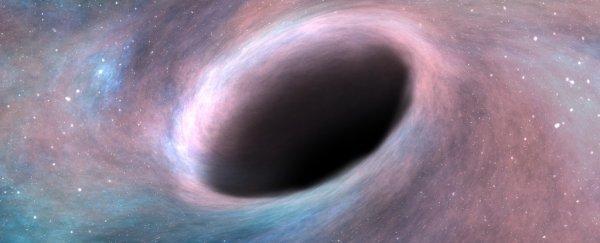Here's a simple how-to on how to construct a traversable cosmic wormhole that could send your spaceship to the furthest reaches of space: take two charged black holes, place them back to back, and thread two cosmic strings through both.
Stretch both strings to infinity and presto! You've got yourself a traversable wormhole.
Confused yet? A team of astrophycisists dreamed up this solution, which could technically send travelers to a distant corner of the Universe, in a preprint paper on arXiv earlier this month - and Ohio State University astrophysicist Paul Sutter published a terrific breakdown of the concept in Live Science.
The barebones: a charged black hole, which is a theoretical black hole that carries an electric charge and has an oppositely charged black hole on the other end of it, will act as our wormhole.
But there's a catch, before you decide to just jump into that wormhole: wormholes are by nature incredibly unstable.
To make sure either charged end stays fully stretched out, a pair of cosmic strings - hypothetical, one dimensional defects in space-time - could hold them in place.
Unfortunately, cosmic strings are also not a great travelling companion.
"You never want to encounter one yourself, since they would slice you clean in half like a cosmic lightsaber, but you don't have to worry much since we're not even sure they exist, and we've never seen one out there in the Universe," Sutter wrote. Phew!
While wormholes - and cosmic strings - have yet to be proven to exist, Russian physicists suggest that we could measure their shape by looking at the ripples they leave behind in space-time.
Unfortunately, these ripples or gravitational waves could sap black holes' mass and cause them to eventually collapse in on themselves.
But the hope is that the strung-up wormhole could be stable for just enough time to send something or someone - say Matthew McConaughey's character in Christopher Nolan's 2014 space movie Interstellar - on a hell of a journey.
This article was originally published by Futurism. Read the original article.
